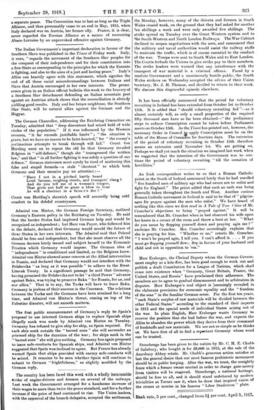The country has been faced this week with a wholly
inexcusable strike of engine-drivers and firemen on several of the railways. Last week the Government arranged for a handsome increase of
th to than t i th tend rd d f f rth
err wages more w ce e peace s a , an or a u er
increase if the price of food continued to rise. The Union leaders,
with the approval of the branch delegates, accepted the settlement. • Bank rate, 5 per cent., changed from 51 per cent. April 5,1917.
On Monday, however, many of the drivers and firemen in South Wales ceased work, on the ground that they had asked for another ten shillings a week and were only awarded five shillings. The strike spread on Tuesday over the Great Western system and to the South-Western and North London Railways. The War Cabinet declined to reopen negotiations with the men, and announced that the military and naval authorities would assist the railway staffs to maintain the traffic, which is of course essential to the conduct of the war. Troops were sent to South Wales and to East London. The Courts forbade the Unions to give strike pay to their members. The strike leaders were warned that any interference with the transport of war material is a criminal offence. Faced by a resolute Government and a unanimously hostile public, the South Wales strikers on Wednesday accepted the advice of their Union Secretary, Mr. J. H. Thomas, and decided to return to their work. We discuss this disgraceful episode elsewhere.


























 Previous page
Previous page